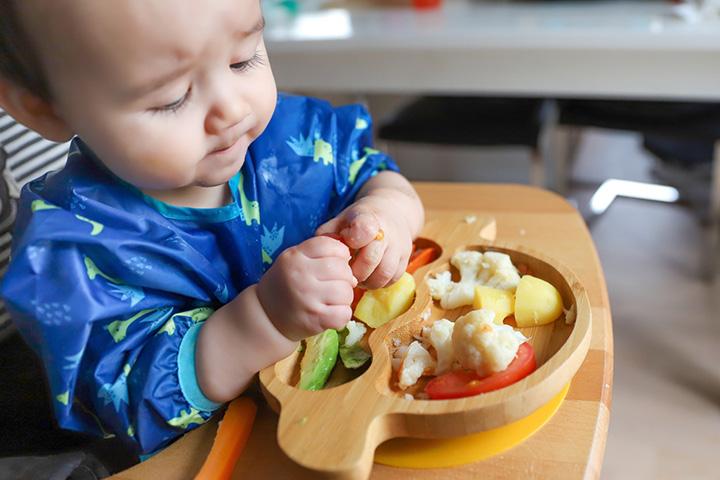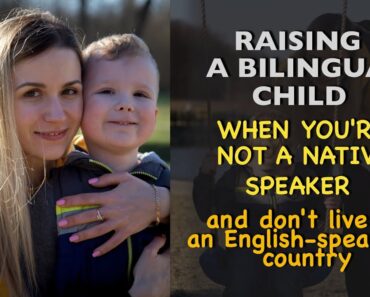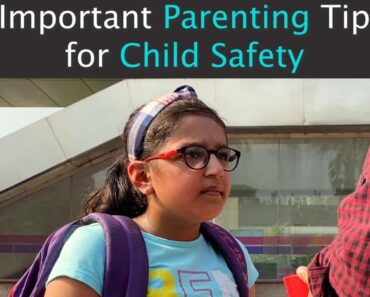image: Shutterstock
Veganism is a dietary practice where people abstain from eating animal products, such as milk, cheese, meat, and fish, due to ethical reasons. It means they only eat plant-based foods and products. Experts claim a well-planned vegan diet is safe and nutritionally adequate for all age groups, including babies and toddlers (1). But since the diet lacks prominent essential nutrient sources, one can’t undermine the deficiency risks it can pose. Therefore, an adequate understanding of the diet’s nutritional structure and associated risks is imperative to raise a healthy vegan baby.
Read on to know more about the vegan diet for babies and toddlers, associated risks, and tips to raise a healthy vegan baby.
When Can Babies Start A Vegan Diet?
Whether vegan or not, exclusive breastfeeding is advisable for babies below six months of age. If a baby can’t have breast milk, soy-based formula is an option (2). Babies six months and older can start a vegan weaning diet (3).
According to experts, a well-planned vegan diet can support infant growth and development. To ensure your infant has optimum nutrition intake:
- Continue breastfeeding for at least up to 12 months, if possible.
- Offer various plant-based weaning foods rich in nutrients, such as protein, calcium, iron, zinc, vitamin A, vitamin D, and vitamin B12 (4).
It is advised to consult a certified pediatric nutritionist to plan a nutritionally adequate and balanced diet for vegan babies and toddlers.
Nutrients That Need Special Attention
Compared to plant-based foods, animal foods contain higher amounts of vital nutrients, such as protein, fat, and certain micronutrients. Therefore, it is pertinent to pay more attention to these nutrients while planning a vegan diet for babies and toddlers (1) (5) (6).
1. Protein: Protein is pivotal for the growth and development of a baby. During the first six months of an infant’s life, breast milk or baby formula can suffice. But as they grow, they need complementary foods to offer them additional protein. For vegan babies and toddlers, this extra protein can come from protein-rich plant foods, such as quinoa, farro, beans, legumes, nuts, seeds, and soy foods, such as tofu and tempeh.
2. Calcium: Babies and toddlers require calcium for healthy bone and teeth development. It is necessary to include calcium-rich foods, such as kale, collards, bok choy, and almonds, in their daily diet. Additionally, you can consult your nutritionist about baby-friendly calcium-fortified vegan drinks and supplements.
3. Iron: Healthy full-term infants have enough iron reserves that support their iron needs up to four to six months after birth. However, after six months, consuming iron-rich foods becomes essential to keep several physiological functions going. Raisins, tofu, green leafy vegetables, guava, watermelon, and figs are some iron-rich foods that you can add to your vegan baby and toddler’s daily diet. Since plant iron (non-heme iron) has low bioavailability, add plenty of vitamin C-rich foods to the diet.
4. Zinc: Zinc is a trace mineral that babies and toddlers require for the proper immune and enzyme functioning, wound healing, taste perception, and overall growth and development (4). You can add wholegrain foods, nuts, tofu, and legumes to your vegan baby’s diet to meet their needs. However, zinc from plant food isn’t well absorbed, so consult your doctor and discuss if zinc supplementation is required.
5. Iodine: It is another essential nutrient for which vegan babies are at risk of deficiency. It is so because iodine found in foods, such as cereals and grains, is in minute amounts (7)
. Additionally, babies under 12 months can’t take iodized salt, the primary source of iodine for older children and adults.
6. Vitamin D: All breastfed infants need to receive 400 IU of supplemental vitamin D each day within a few days after birth (8). The supplementation continues until the baby weans off breast milk and drinks at least one liter of whole milk every day. Since vegan toddlers don’t consume animal milk, they should consume vitamin D-fortified plant milk, such as soy milk, and fortified cereals. If you feel your toddler isn’t getting enough vitamin D, check about supplementation with your doctor.
7. Vitamin B12: Breastfed infants whose mothers consume adequate vitamin B12 or those on baby formula get sufficient vitamin B12. However, babies whose mothers don’t take animal products are at risk of vitamin B12 insufficiency/deficiency. Since vitamin B12 isn’t present in plant-origin foods, its supplementation may become necessary even for vegan toddlers consuming B12-fortified milk or cereal. Vitamin B12 supports healthy red blood cell production and brain development in babies and toddlers (9).
8. Omega-3 fats: Plant foods lack EPA and DHA. EPA and DHA are essential fatty acids necessary for healthy eye and brain development. Although the body can convert ALA (an essential fatty acid found in plant foods) to EPA and DHA, the conversion is low (10). Therefore, pediatric consultation is advisable to know about DHA supplementation for babies and toddlers. Some of the plant sources of omega-3 fats are walnuts, flax seeds, chia seeds, hemp seeds, and canola oil.
Risks Associated With Vegan Diet
An imbalanced vegan diet raises the risk of nutrient insufficiency/deficiency or excess.
1. Nutrient insufficiency or deficiency: Insufficient amounts of calcium and vitamin D in the diet can affect an infant and toddler’s bone and teeth development. Likewise, insufficient iron in their daily diet can lead to iron deficiency. Iron deficiency, when left untreated, can progress to iron deficiency anemia (IDA), causing issues such as loss of appetite, poor growth, and enlarged spleen (11).
2. Nutrient excess: Just like nutrient deficiency, nutrient excess can also cause problems. For instance, excess fiber can fill your baby and toddler’s small tummy and reduce appetite. Besides, it may interfere with the absorption of other nutrients, such as fats and minerals, in some babies (12). So, adhere to the nutritional intake prescribed by your baby’s doctor. Also, don’t use any supplement for your little one without consulting your healthcare provider.
Tips To Raise A Healthy Vegan Baby
Here are some simple tips that can help raise a healthy vegan baby.
1. Research about the vegan diet and its associated risks for babies and toddlers. It will help you stay aware of what challenges you may face while raising a vegan baby or toddler. Besides, you can note questions or queries that would need discussion with your doctor.
2. Inform your pediatrician about your choice of raising a vegan baby. It is pertinent as your doctor can monitor your baby and toddler accordingly. Besides, they can stay watchful of any signs and symptoms of nutrient insufficiency or deficiency and act promptly by suggesting supplements or other alternatives.
3. Consult a pediatric nutritionist who has considerable exposure to vegan meal planning. Such experts can help you plan age-appropriate, wholesome meals for your baby and toddler. They can give you a thorough insight into the nutrients your baby requires and how you can get those nutrients from a plant-based diet. Besides, they can also alert you on your baby/toddler’s vulnerability for deficiencies and the ways to avert the risk.
4. Include various plant foods in your baby or toddler’s diet. Doing so can make it easy to get the required nutrients from different sources. While you add different foods, ensure you serve each food in different ways. For instance, for babies who have just started solids, you can first introduce mashed beans, moving to soy-yogurt and crumbled tofu gradually.
5. Make meals attractive and flavorful. Ensure you add age-appropriate seasonings and herbs to add flavor to food. It will help expose babies to different tastes and will lure toddlers into eating food without much fuss. Involve your toddler in meal preparation to help them know more about veganism.
6. Look for fortified foods. Vegan babies and toddlers may develop vitamin and mineral deficiencies over time. To avert that possibility, buy foods fortified with vitamins and minerals. For instance, commercial infant cereals fortified with vitamin A, vitamin D, and iron are a good choice.
7. Serve three main meals and two to three snacks to meet your vegan baby or toddler’s energy needs. Include a mix of refined and whole grains and various protein and energy foods, such as beans and pulses, smooth seed and nut butter, and starchy foods, such as pasta and potato. Also, involve foods rich in nutrients such as iron, vitamin C, calcium, zinc, and omega-3.
8. Avoid fiber excess, especially in babies, by feeding them strained purees. Additionally, rather than feeding them raw, you can feed soft-cooked/steamed fruits and veggies. Gradually as the baby grows, you can raise their fiber intake. Since a plant-based diet offers high amounts of fiber, it is advisable to make your baby and toddler drink plenty of water.
9. Avoid plant-based milk until the baby is 12 months old. After 12 months, fortified milk is the best milk alternative to choose. If the toddler has a soy allergy, consult your pediatrician to select a suitable alternative, such as rice or oats milk.
10. Indulge in regular nutritional evaluation. It means periodic measurement of your baby’s height and weight. Additionally, check the achievement of various developmental milestones. If you feel the baby isn’t meeting the milestones or their growth curve isn’t going as it should be, talk to your healthcare provider.
Other than these, avoid control and let your toddler choose. Understand what your child likes and let them make a choice. Offering variety and giving the baby or toddler the power of choice are excellent ways to make them eat all types of food items with minimal fuss.
When Not To Put Your Baby On Vegan Diet?
Unless directed otherwise, you shouldn’t put your baby or toddler on a vegan diet in the following scenarios (13).
- The baby is born prematurely and requires a protein and fat-rich diet to catch up with their growth and development.
- The baby is allergic to foods such as soy, nuts, or seeds.
- The baby or toddler has a medical condition that is affecting their ability to eat or digest food.
- The toddler is a picky eater and resists restrictions associated with the vegan diet.
Veganism is a personal choice, but before deciding to make your baby vegan, consult a pediatrician. They can help you determine if veganism is the right choice for your baby. Besides, they can educate you on the associated risks. With proper guidance from your pediatrician and support from a nutrition expert, you can plan a healthy vegan diet for your baby and toddler.


































